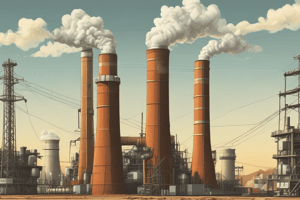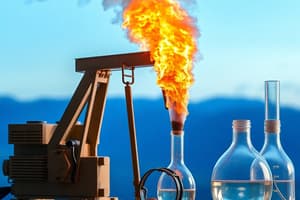Podcast
Questions and Answers
What is the primary characteristic of non-renewable fuels?
What is the primary characteristic of non-renewable fuels?
- They were formed over millions of years ago (correct)
- They are abundant in nature
- They can be replenished easily
- They are a type of fossil fuel
What type of change occurs in a combustion reaction?
What type of change occurs in a combustion reaction?
- Decomposition reaction
- Physical change
- Chemical change (correct)
- Reversible change
What is the term for the chance of damage or injury from a hazard?
What is the term for the chance of damage or injury from a hazard?
- Oxidation
- Risk (correct)
- Hazard
- Danger
What is the purpose of a word equation?
What is the purpose of a word equation?
What occurs in an exothermic change?
What occurs in an exothermic change?
What is the term for a starting substance in a chemical reaction?
What is the term for a starting substance in a chemical reaction?
What is a characteristic of a physical change?
What is a characteristic of a physical change?
What is the term for a chemical reaction in which a compound breaks down into simpler compounds?
What is the term for a chemical reaction in which a compound breaks down into simpler compounds?
What is true about the total mass of reactants and products in a chemical reaction?
What is true about the total mass of reactants and products in a chemical reaction?
What is the term for a fuel that burns to transfer useful energy?
What is the term for a fuel that burns to transfer useful energy?
Flashcards are hidden until you start studying
Study Notes
Fossil Fuels and Energy
- Fossil fuels are formed from the remains of animals and plants that died millions of years ago.
- Examples of fossil fuels include coal, oil, and natural gas.
- Fossil fuels are non-renewable, meaning they take millions of years to form and will eventually run out.
Chemical Reactions
- Oxidation is a chemical reaction where substances react with oxygen to form oxides.
- Combustion is a chemical reaction where a substance reacts quickly with oxygen, releasing light and heat.
- Decomposition is a chemical reaction where a compound breaks down into simpler compounds and/or elements.
Chemical Equations
- A word equation is a way to represent a chemical reaction, with reactants on the left and products on the right, separated by an arrow.
- A balanced symbol equation uses chemical formulae to represent reactants and products, showing how atoms are rearranged and the relative amounts of reactants and products.
Chemical Principles
- Conservation of mass states that the total mass of reactants equals the total mass of products in a chemical reaction.
- Endothermic changes transfer energy from the surroundings, while exothermic changes transfer energy to the surroundings.
General Terms
- A hazard is a possible source of danger.
- A reactant is a starting substance in a chemical reaction.
- A product is a substance made in a chemical reaction.
- A physical change is a reversible change, where new substances are not formed.
- A discrete variable is one that can only have whole-number values.
Studying That Suits You
Use AI to generate personalized quizzes and flashcards to suit your learning preferences.




